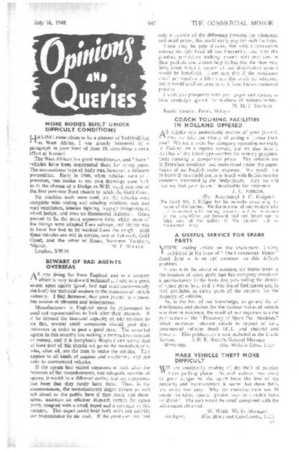MORE BODIES BUILT UNDER DIFFICULT CONDITIONS
Page 35

If you've noticed an error in this article please click here to report it so we can fix it.
HAVING some claim to be :a pioneer of bodybuilding
in West Africa, I was greatly interested in a paragraph in your issue of June 18, describing a stout effort at Kumasi The West African is a good woodworker, and " bush " vehicles have been constructed there for many years. The conventional type of body was, however, a different proposition. Early in 1946, when vehicles were at a premium, two bodies to my own drawings were built to fit the chassis of a Dodge ex-WD. truck and one of the first post-war Ford chassis to reach the Gold Coast.
No machine tools were used, but the vehicles were complete with sliding and winding windows, side and roof ventilators, interior lighting, luggage compartment, wheel locker, and even an illuminated indicator. Glass proved to be the most expensive item, whilst most of the fittings were adapted from salvage, and timber was to hand but had to be worked from the rough. Both these vehicles are still in service, one at Takoradi, Gold Coast, and the other at Kano, Northern Territory,
Nigeria. W. F. WALKER. London, S.W.1-6
BEWARE OF BAD AGENTS OVERSEAS
. AS one living far from England and in a country
which is very backward technically, I rely to a great extent upon agents (good, bad -and indifferent—mostly the last!) for technical matters in the commercial vehicle industry. I find, however, that your journal is a ceaseless source of pleasure and information.
Manufacturers in England must be encouraged to send out representatives to look after their interests. If it be beyond the financial capacity of one concern to do this, several small companies should pool their resources in order to post a good man. The so-called agents in this county are making a tremendous amount of money, and it is completely illogical and unfair that at least part Of this should not go to the manufacturers, who, after all, are the men to make the articles. This applies to all kinds of engines andmachinery, and not only to commercial vehicles.
If the agents had skilled engineers to look after the interests of the manufacturers, and adequate supplies of spares, it would be a different matter, but my experience has been that they rarely have these. Thus, in the circumstances, the manufacturers might almost as well sell direct to the public here if they could and themselves maintain an efficient dispatch system for spare parts, coupled with a small depot and a manager in this country. This depot could hold bulk units not suitable for transmission by -air mail. If the producer obtained
only a quarter of the difference between the wholesale and retail prices, this could easily pay for such facilities.
These may be pipe dreams, but with Communism rearing its ugly head all too frequently, and with the planting population walking around with revolvers in their pockets, one cannot help feeling that the time may have come when a review of our distribution system would be beneficial. I am sure that if the producers could get together a little more this could be achieved, but it would need courage to split from the conventional practice.
I wish you prosperity with your paper and success in your campaign against the madness of nationalization.
M. M. J. STEVENS. Kuala Kangjar, Perak, Malaya.
COACH TOURING FACILITIES IN HOLLAND OFFERED
AS regular and enthusiastic readers of your journal, may we take the liberty of asking a favour from you? We are a motorbus company operating normally in Zeeland on a regular service, but we also have a number of the latest-type coaches for touring purposes, these running at competitive prices. The vehicles are in first-class condition and maintained under the supervision of an English motor engineer. We would like to know if you could put us in touch with British touring concerns interested in the Netherlands. May we acid that we find your journal invaluable for reference.
J. C. KRUGER.
(For Autobedrijf J. C. Krijger.)
[We thank Mr. J. Krijger for his remarks concerning the value of this journal. No doubt some of our readers who are connected with touring concerns will be interested in the proposition put forward, and any letters sent to him, care of the Editor of this journal, will be forwarded—En.]
A USEFUL SERVICE FOR SPARE PARTS
VOUR leading article on the spare-parts famine, I published in the issue of "The Commercial Motor" dated June 4, is an apt comment on this difficult
problem. • It was with the object of assisting the motor trade in the location of spare parts that this company circulated a questionnaire to the trade last year asking for details of spare parts held, and it was found that spares are, in fact, available in -many parts of the country for the majority of vehicles.
As, to the best of our knowledge, no general list of distributors and dealers for the various makes of vehicle was then in existence, the result of our inquiries was the publication of the "Directory of Spare Part Stockists," which embraces relevant details in respect of cars, commercial vehicles (both 1.C.E. and electric) and tractors. This publication is now included in the Guide.
Service. J. H. E. HASLIN, General Manager.
Weybridge. (For William Glass, Ltd.) MAKE VEHICLE THEFT MORE DIFFICULT
WE arc continually reading of the theft of coaches " from parking places As such actions may result in great danger to life, apart from the loss of the property and inconvenience, it seems that these thefts are made too easy. Why do manufacturers not fit master switches, Special ignition keys or suitable locks on doors? The cost would be small compared with the advantages obtained.
W. WADE, Works Manager.
Blackpool_ (For Blackpool Coachcrafts, Ltd.)












































































